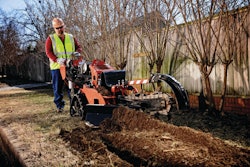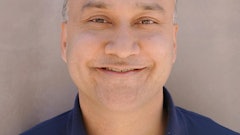San Jose's roads are starting to fall apart after a decade of budgetary red ink. Cracks and potholes multiply like spring weeds, the pavement ranks worst in the county and motorists are griping more than ever about rougher rides through town.
City officials have a plan to fix all this, and will give it an airing before the City Council on March 5. But San Jose residents, grab your wallets, because it's going to cost you.
"Funding sources we relied on over past decades are insufficient to cover current needs," said Hans Larsen, San Jose's transportation director.
The solution, he said, is new taxes -- plural. City officials aren't thinking about one tax measure but three to pay for San Jose's current and ongoing road repair and maintenance needs.
What are those needs?
San Jose currently spends $20 million a year on roads. Larsen said it should be five times that -- $100 million annually -- to keep city roads from deteriorating further. Overall, San Jose streets average a "fair" pavement rating, but nearly a fourth of the city's 2,410-mile road network rates poor. At current spending levels, the city's entire road network will average a poor rating by 2020, Larsen said.
And on top of the need to quintuple the road maintenance budget, San Jose has built up a $339 million backlog of repair work to fix 375 miles of neighborhood streets already in poor shape.
Getting all that cash won't just take a single tax measure, Larsen said.
San Jose resident Dan Nguyen, 37, would gladly vote for tax measures, but only if the money was guaranteed for roads.
"I don't mind," Nguyen said. "The only problem is would they spend the money on what they said they would spend it on?"
But Dave Cimolino, 72, said he'd definitely oppose any new city tax for roads.
"The taxes already in place should be sufficient," Cimolino said. "They've got to figure out a way to make the money they have work for them."
City leaders already are strongly considering a general San Jose sales tax that could possibly go before voters in June 2014. A general tax allowing city leaders to spend the money as they see fit would not guarantee a share of funding for roads but would require only majority approval under state law. Recent city polling suggested up to 70 percent of likely voters might support a quarter-cent city sales tax and up to 57 percent might support a half-cent measure, though much of the support was tentative.
Larsen has urged city officials to pursue the higher half-cent measure, arguing the estimated revenue of up to $64 million a year would be enough to ensure a significant slice for roads. A quarter-cent tax would deliver about half as much revenue.
Larsen also is recommending the city seek to "amend and extend" the 30-year half-cent countywide sales tax that voters approved in 2000 to pay for BART and other public transit. The idea would be to continue the tax forever and allow some of the proceeds to be spent on city streets instead of just transit.
But that's not all. To tackle the backlog of road repairs, Larsen is recommending a $295 million street repair bond measure, which would cost the average homeowner about $100 a year. San Francisco voters in 2011 passed a $248 million bond measure that included $148 million to repair streets, with the balance to be used for bikeways, sidewalks, traffic signals and curb ramps.
Patrick Maxwell, 44, who was fueling up at a Willow Glen Chevron station, said he appreciates the value of having good roads in the city after having to pay $800 to repair damage to his car from hitting a pothole in an East Bay city. But he was taken aback when told the city might ask him to pay at least $100 a year more for roads.
"That's a little steep," Maxwell said.
A tax or bond measure dedicated to a specific program such as roads would require two-thirds voter approval. Recent city polling suggested only 54 percent of likely city voters would pay about $100 a year more to fix roads, well short of the required two-thirds threshold.
City officials, however, have been urging lawmakers in the state Capitol, where Democrats who until recently held a supermajority have been weighing a number of new tax ideas, to put a measure on the ballot that would lower the threshold for approving transportation measures to 55 percent.
Larsen acknowledged that new taxes for roads will be a tough sell.
"There is a perception that existing taxes people pay are sufficient to cover basic services such as pavement maintenance," Larsen said. "But we are at a point where almost no city money is going to pavement maintenance."
Of the $20 million San Jose now spends on roads, just $3 million comes from city sources -- in this case, construction taxes. The rest comes from federal and state gas taxes -- a figure that is declining due to rising fuel efficiency -- and vehicle registration fees.
Councilman Don Rocha, who sits on the city's transportation committee, questioned the need to seek so many taxes for roads. But Councilman Sam Liccardo, who leads the committee, said the city just doesn't have any spare dollars for roadwork.
"We've found all the dimes and quarters under the couch pillows," Liccardo said, "And $80 million isn't anywhere in the couch."
San Jose road Facts
--Miles of city roads: 2,410
--Miles of city roads rated "poor": 375
--Average condition of city roads: "Fair"
--Annual city spending on roads: $20 million
--Average condition of city roads by 2020 at current spending level: "Poor"
--Estimated annual city spending to prevent further deterioration: $100 million
--Estimated one-time cost of repairing roads in poor condition: $339 million
Proposed solutions
--Quarter-cent sales tax (up to $32 million a year, not guaranteed for roads)
--Half-cent sales tax (up to $64 million a year, not guaranteed for roads)
--$295 million bond measure for one-time repairs (approximately $100 a year per household)
Copyright 2013 - San Jose Mercury News


















